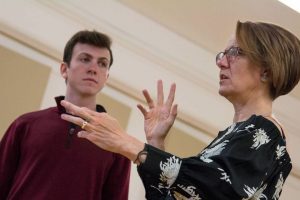Teaching: a Statement of Philosophy
It’s not unusual for a voice teacher to come to that occupation after decades of work as a soloist. Nevertheless, it’s been a revelatory experience for me to transition to this role, and encounter a dimension of entirely new perspectives and challenges. Being a mentor and guide to young vocal artists warrants revisiting all the formative experiences I myself had, now with the benefit of a mature vantage point. What type of interactions had “traction?” How did thirty years of musical encounters coalesce into a paradigm that integrates both technical and artistic skill sets, to forge vivid connections with listeners in a concert venue, as well as with listeners in the studio and classroom? Can I reverse-engineer decades of eclectic performance curation, in order to recognize the mindset and mastery needed to set forth on a fulfilling path in the 21st century?
A robust engagement with voice science has become a foundation for today’s singers-in-training. It has transformed our pedagogy in a fundamental way, illuminating “beautiful singing” as idiomatic and achievable by many, many more aspiring vocalists than we’d expected in previous generations. A voice teacher today has encountered a genre-specific Clash of the Titans, as singers pivot between the allure of fascinating but exclusive insider information versus a more quantifiable shared understanding of anatomy, acoustics and cognition. Is evidence-based pedagogy removing obstacles… or is it grievously flattening the terrain? The bright line that illuminates the value of an artist can now be drawn much more inclusively, elevating “what will I choose to convey?” to our primary mission. I believe good teaching and good technique clear away many impediments that can be mistakenly ascribed to meager talent, or limited vision. A longing for connection via expressivity motivates singing—but improving technical efficiency will reveal an unsuspected range of eloquence.
